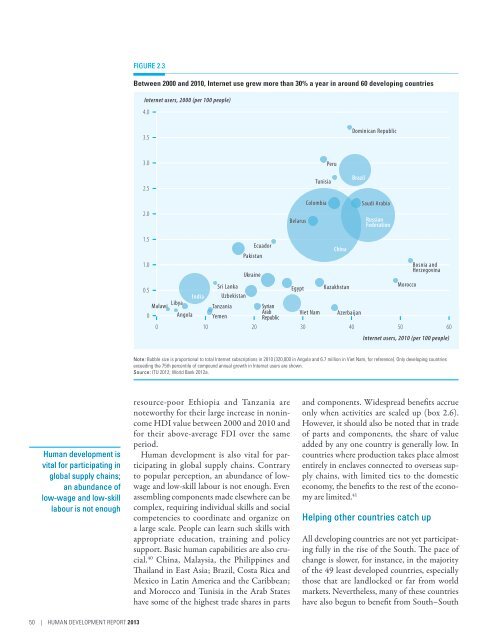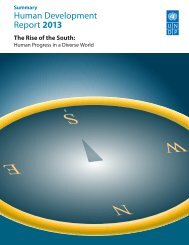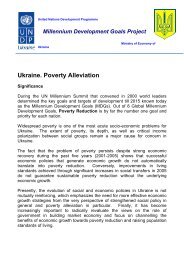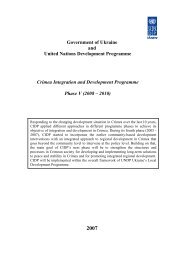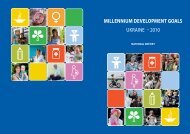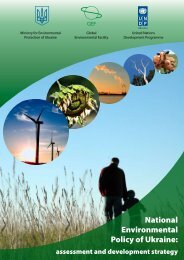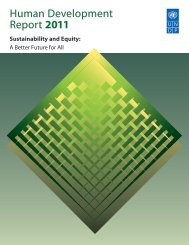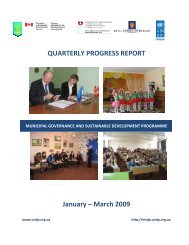E N S W - United Nations Development Programme
E N S W - United Nations Development Programme
E N S W - United Nations Development Programme
You also want an ePaper? Increase the reach of your titles
YUMPU automatically turns print PDFs into web optimized ePapers that Google loves.
Figure 2.3<br />
Between 2000 and 2010, Internet use grew more than 30% a year in around 60 developing countries<br />
Internet users, 2000 (per 100 people)<br />
4.0<br />
3.5<br />
Dominican Republic<br />
3.0<br />
2.5<br />
2.0<br />
Peru<br />
Tunisia<br />
Colombia<br />
Belarus<br />
Brazil<br />
Saudi Arabia<br />
Russian<br />
Federation<br />
1.5<br />
Ecuador<br />
China<br />
Pakistan<br />
1.0<br />
Bosnia and<br />
Herzegovina<br />
Ukraine<br />
Sri Lanka<br />
Morocco<br />
0.5<br />
Egypt Kazakhstan<br />
India Uzbekistan<br />
Malawi<br />
Libya<br />
Tanzania<br />
Syrian<br />
Arab<br />
Viet Nam<br />
0<br />
Angola<br />
Azerbaijan<br />
Yemen<br />
Republic<br />
0 10 20 30 40 50 60<br />
Internet users, 2010 (per 100 people)<br />
Note: Bubble size is proportional to total Internet subscriptions in 2010 (320,000 in Angola and 6.7 million in Viet Nam, for reference). Only developing countries<br />
exceeding the 75th percentile of compound annual growth in Internet users are shown.<br />
Source: ITU 2012; World Bank 2012a.<br />
Human development is<br />
vital for participating in<br />
global supply chains;<br />
an abundance of<br />
low-wage and low-skill<br />
labour is not enough<br />
resource-poor Ethiopia and Tanzania are<br />
noteworthy for their large increase in nonincome<br />
HDI value between 2000 and 2010 and<br />
for their above-average FDI over the same<br />
period.<br />
Human development is also vital for participating<br />
in global supply chains. Contrary<br />
to popular perception, an abundance of lowwage<br />
and low-skill labour is not enough. Even<br />
assembling components made elsewhere can be<br />
complex, requiring individual skills and social<br />
competencies to coordinate and organize on<br />
a large scale. People can learn such skills with<br />
appropriate education, training and policy<br />
support. Basic human capabilities are also crucial.<br />
40 China, Malaysia, the Philippines and<br />
Thailand in East Asia; Brazil, Costa Rica and<br />
Mexico in Latin America and the Caribbean;<br />
and Morocco and Tunisia in the Arab States<br />
have some of the highest trade shares in parts<br />
and components. Widespread benefits accrue<br />
only when activities are scaled up (box 2.6).<br />
However, it should also be noted that in trade<br />
of parts and components, the share of value<br />
added by any one country is generally low. In<br />
countries where production takes place almost<br />
entirely in enclaves connected to overseas supply<br />
chains, with limited ties to the domestic<br />
economy, the benefits to the rest of the economy<br />
are limited. 41<br />
Helping other countries catch up<br />
All developing countries are not yet participating<br />
fully in the rise of the South. The pace of<br />
change is slower, for instance, in the majority<br />
of the 49 least developed countries, especially<br />
those that are landlocked or far from world<br />
markets. Nevertheless, many of these countries<br />
have also begun to benefit from South–South<br />
50 | HUMAN DevELOPMENT REPORT 2013


